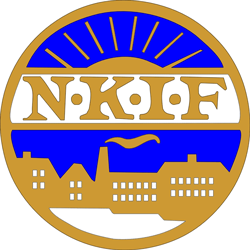Related Research Articles

The World Federation of Trade Unions (WFTU) is an international federation of trade unions established in 1945. Founded in the immediate aftermath of World War Two, the organization built on the pre-war legacy of the International Federation of Trade Unions as a single structure for trade unions world-wide, following the World Trade Union Conference in London, United Kingdom.

The Norwegian Confederation of Trade Unions is a national trade union center, decidedly the largest and probably the most influential umbrella organization of labour unions in Norway. The 21 national unions affiliated to the LO have almost 1,000,000 members of a Norwegian population of 5 million. The majority of affiliated unions organizes traditional blue collar workers, but the largest affiliate is the Norwegian Union of Municipal and General Employees which makes up more than a third of all members. LO is affiliated to the ITUC and the ETUC.

The Iron and Steel Trades Confederation (ISTC) was a British trade union for metal-workers and allied groups, being the largest union in these fields. It was formed on 1 January 1917 as a merger of existing steel-workers' unions and it is now part of Community.
Community is a British trade union which formed in 2004. The union represents workers in a diverse range of sectors, including iron and steel, justice and custodial, domestic appliance manufacturing, textiles and footwear, road transport, betting, the third sector, education and early years as well as the self-employed.

Lars Samuel Myhrer Evensen was a Norwegian trade unionist and politician. He belonged to the Communist Party in the 1920s, but later joined the Labour Party. He was also deputy chairman of the Norwegian Confederation of Trade Unions. After the Second World War he served for many years as Minister of Industry. Trade unions work to strengthen members' rights and work terms and conditions, and play a key role in, for example, salary negotiations.
The United Federation of Trade Unions is a general union in Norway. With a membership of 150,000 it is the largest private sector union in the country.

The Norwegian Union of General Workers is a trade union in Norway. It has a membership of 33,000 and is affiliated with the Norwegian Confederation of Trade Unions (LO).

The Norwegian Union of Chemical Industry Workers was a trade union representing workers in the chemical industry in Norway.
John Marius Trana was a Norwegian trade unionist and politician for the Labour Party. He chaired the Norwegian Union of Railway Workers from 1945 to 1963, and served as a deputy representative in the Norwegian Parliament.
The Norwegian Union of Clothing Workers was a trade union in Norway, organized under the national Norwegian Confederation of Trade Unions.
Halfdan Jønsson was a Norwegian trade unionist and resistance member. He was born in Frol Municipality. He was elected chairman of the Norwegian Union of Chemical Industry Workers in 1924. In 1934 he served as vice chairman of the Norwegian Confederation of Trade Unions, until November. He died in the Dachau concentration camp in 1945.

The German Clothing Workers' Union was a trade union representing people involved in making clothing in Germany.
The Italian Federation of Textile Workers was a trade union representing workers in textile manufacturing and processing in Italy.

The Garment Workers' Union was a trade union representing workers in the clothing industry in Norway.
The Norwegian Union of Shoe Makers was a trade union representing workers in the shoe manufacturing industry in Norway.
The Norwegian Union of Planing Workers was a trade union representing workers in saw mills and related fields in Norway.
The Norwegian Union of Meat Industry Workers was a trade union representing workers in abattoirs and butchers in Norway.

The Norwegian Union of Electricians and Power Station Officials was a trade union representing workers in jobs relating to electricity, in Norway.
References
- ↑ "Tolv anleggsarbeidere stiftet Arbeidsmandsforbundet for 125 år siden. En ting var felles for alle som ble med". Frifagbevegelse. Retrieved 13 November 2020.
- ↑ Beretning for aaret. Oslo: Norwegian Confederation of Trade Unions. 1924.
- ↑ Ebbinghaus, Bernhard; Visser, Jelle (2000). Trade Unions in Western Europe Since 1945. Basingstoke: Palgrave Macmillan. p. 522. ISBN 0333771125.